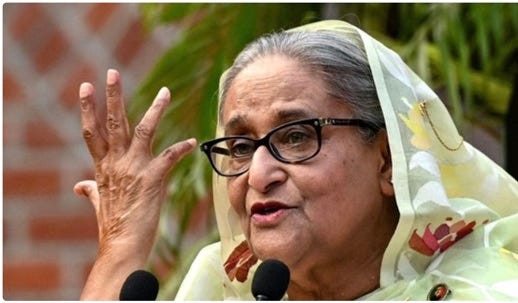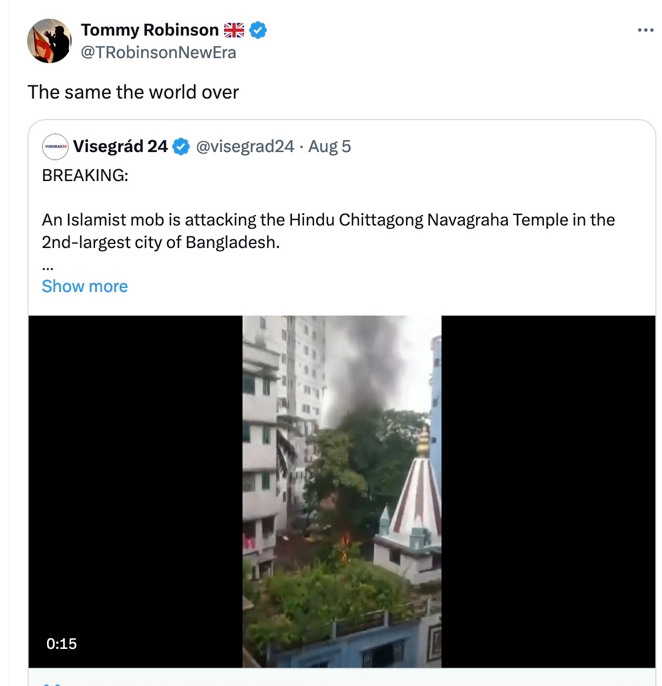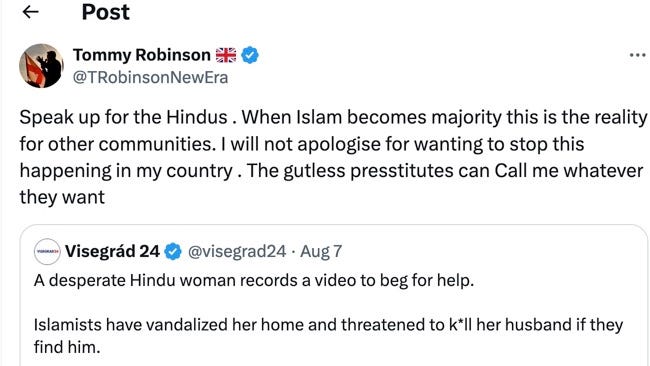The BBC's Masterclass in Disinformation.
The BBC's Disinformation Team claim they exposed fake news about violence in Bangladesh but they actually distorted the truth by diminishing the reality of Islamist attacks on Hindus.
Listen to the BBC lately and you could be forgiven for thinking the biggest problem about the recent violence in Bangladesh is that the Far Right in this country have tweeted about it.
Last week the Corporation published an investigation by its grandly-named Global Disinformation Team (sic) into fake news about attacks on Hindus in Bangladesh in the wake of the overthrow of that country’s autocratic Prime Minister Sheikh Hasina.
The investigation’s main contention was that fake news, mainly from India, had been amplified by the likes of Tommy Robinson whose retweets were apparently striking fear into the hearts of the Hindu minority that makes up just 7% of the population in Bangladesh.
Robinson had indeed retweeted claims of attacks that turned out not to be true, including one with a photograph that purported to be of “an Islamist mob” attacking a Hindu temple in Chittagong.
The BBC revealed the smoke in the photograph which appeared to come from a temple actually emanated from a torched office of the ruling party, the Awami League, located behind it. I hold no candle for Robinson but it’s worth pointing out there is no evidence he knew the story was fake. The BBC report itself made clear,
“Working out exactly what has happened in Bangladesh over the last few weeks has proved difficult.”
If the BBC had stopped here then no one could possibly complain. Spreading fake stories, whether or not you know they are true, is certainly disinformation. There’s also no doubt that Robinson used these fake stories to push his favoured narrative that Islam is a malign force that does not respect the rights of non-Muslims.
“When Islam becomes majority this is the reality for other communities”, he wrote alongside a retweet of another alleged attack on Hindus the BBC says was actually a property dispute.
The Disinformation Team did not stop there though. It made a bolder claim that Robinson was part of a global attempt to tarnish the reputation of Muslims in Bangladesh by misrepresenting the violence as religious when most of it was political,
“right-wing Indian accounts are spreading these politically motivated attacks as religious ones,” it quoted an expert claiming.
Hindus do indeed make up a disproportionate number of both the members and supporters of the Awami League. That is a political fact. It also has a religious resonance it is foolish to play down. The party has long been seen as the champion of secularism and for that it is loathed by …Islamists. This means in Bangladesh there is just as much danger in ignoring the importance of religion as a motivation for mob violence as there is in exaggerrating it. The report does just that.
I decided to write about something different this time. No men in lingerie you’ll be happy to see.
The trans debate has sharpened all our instincts about the importance of accurate reporting, and the skew the BBC gave to some of its coverage about Bangladesh recently was a perfect example of what happens when journalists abandon critical thinking and skepticism.
The irony is that in trying to land one on Tommy Robinson, whom I can’t stand, the Corporation did a terrible disservice to the good people of Bangladesh, a country I have long admired.
It took longer to find out the truth about the violence in Bangladesh than I expected. I hope you agree the end result is about as comprehensive as you’re likely to read outside of an ambassador’s report.
If you’re a paid subscriber already, thank you! Your fees are what allows me to do this sort of deep dive. If you are a free subscriber then it would be fantastic if you could consider supporting my work by trading up. I’ll be very grateful.
Malcolm
When a journalist or politician seeks to distract from a huge and important story - say mob attacks driven by religious bigotry- by focusing on smaller controversies that is also a recognised form of disinformation. It’s what liars from Putin to Trump do all the time. As for those who dismiss the seriousness of an unfolding tragedy they too are wallowing in the mud of disinformation.
To its shame the BBC’s investigation is guilty of both of those kinds of disinformation, making the report of its Global Disinformation Team as misleading, ironically, as the social media posts of Britain’s most notorious Far Right agitator.
That may seem a remarkable claim. To prove it I’ll dissect the BBC’s investigation, and try to unravel what is really going on in Bangladesh. That’ll require me to explore the tortured history of Bangladesh, a country I have been observing avidly ever since filming there twenty years ago….for the BBC.
What became clear to me then was that the threat of violence hangs over the Hindu minority. Why would it not? The vicious hatred of Islamic fundamentalists for Hindus and other religious minorities has been a central feature of the story of Bangladesh even before the country’s painful birth in 1971.
That hatred has expressed itself regularly in outbursts of savagery. It also led directly to traumatic events that are defining elements in the country’s collective memory: the massacre of Hindus during the Independence struggle as well as the systematic mass rape of thousands of Hindu women. At the heart of that story is one word: Razakar.
So loaded with meaning is this word that when Sheikh Hasina used it last month it sealed her fate.




